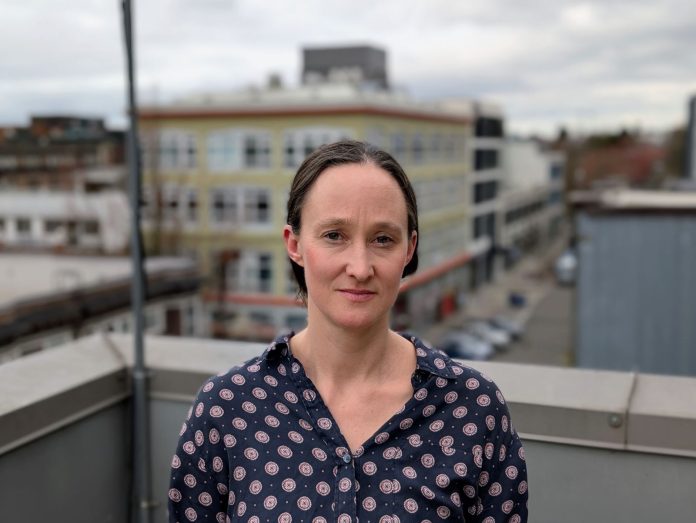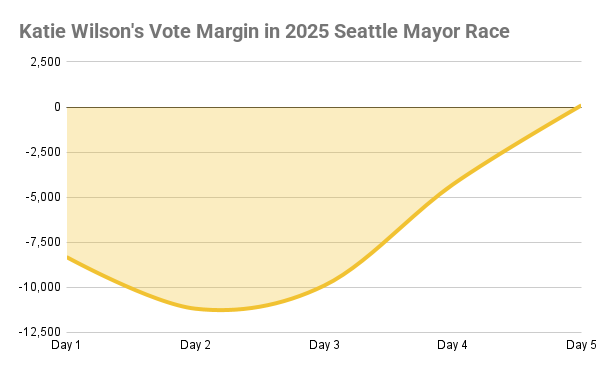
Katie Wilson now leads incumbent Seattle Mayor Bruce Harrell by a razor-thin 91-vote margin after another batch of votes were counted Monday. It would appear Wilson has pulled off a dramatic comeback, after trailing by 11,183 votes in earlier results Wednesday, when Harrell clung to an eight-point lead.
So far, officials have counted 272,041 ballots in Seattle, which is nearly 54% turnout. After Monday’s batch, Election officials report about 13,000 votes remain to be processed in King County — with likely a bit over half in Seattle.
On election night when about 118,000 ballots were tabulated, Harrell claimed a seven-point lead. Seattle elections have long had a pattern where the early vote leans conservative, while the late vote skews progressive. In the past, progressive candidates have closed large margins to pull off late comebacks, which gave Wilson supporters hope, despite their early disadvantage.
SEATTLE!!! We’ve now taken the lead by 91 votes! 🤯 This thing is certainly not over! Over 1,000 ballots have been challenged, so if you haven’t tracked your ballot yet get on it! Our trusty volunteers have been working hard to "cure" ballots so they count! We're so close!
— Katie Wilson for Seattle (@wilsonforseattle.bsky.social) November 10, 2025 at 4:16 PM
[image or embed]
Wilson gained ground on Thursday, closing the gap to 5.7 points by grabbing 51.6% of that batch. Friday’s ballot drop was even more favorable to the progressive challenger. Wilson trimmed Harrell’s lead to 1.9 points or 4,300 votes by winning nearly 55% of Friday’s batch. At that point, Wilson predicted that she would win.
“We’re on the right track,” Wilson said in a Friday statement. “If the drop on Monday follows the same trajectory, we will be squarely ahead.”
As it stands Monday, Wilson has won 49.83% of the vote to 49.79% for Harrell, a slim 0.04% advantage, which would be in recount territory. However, Wilson could continue to gain margin in remaining ballots and take the race out of the recount threshold. Wilson won 55.5% of the batch on Monday, slightly improving her trajectory from Friday.

Even if a recount does happen, it rarely changes the outcome of a race, particularly in favor of the more conservative candidate. Statistically, challenged ballots tend to come from younger voters, who generally break for progressives.
There's still a lot of curable ballots from Seattle (about 1,800). Most are unsigned or signature mismatches, and most skew younger.
— The Urbanist (@theurbanist.org) November 10, 2025 at 1:02 PM
[image or embed]
Election officials report they have received 1,800 ballots they could not count due to a lack of a signature or a lack of match to the signature on file. In Washington state, these ballots are often curable. To cure a challenged ballot, a voter should reach out to King County Elections to verify their identity. Voters can track their ballot status on King County’s ballot tracker.
Election implications
The election has big policy implications for Seattle. The long-time head of Seattle Transit Riders Union, Wilson cobbled together a broad grassroots coalition on the strength of her affordability-focused message. In addition to seeking to lower the cost of essentials like housing, food, child care, and transportation, Wilson also emphasized the need to take bolder action to improve transit service and road safety.
The Urbanist Elections Committee (of which I am one of 14 members) was won over and endorsed Wilson over the incumbent, whose focus on those issues has been inconsistent.
Wilson won the primary election by nearly 10 points, but Harrell was able to close the gap by shifting his rhetoric and espoused stances in a more progressive direction, aggressively attacking his opponent, and enticing more than $1.8 million in independent expenditures on his behalf from a corporate-backed political action committee (PAC). Wilson had a PAC backing her as well, but it was outspent by at least four to one.
Other Seattle results
Harrell outperformed the other centrists by a wide margin in what has been a wave year for Seattle progressives.
Seattle City Council President Sara Nelson has won just 37% of the vote, with progressive nonprofit leader Dionne Foster cruising to victory with 62% in the citywide Position 9 race. In District 2, Seattle Office of Housing attorney Eddie Lin is winning 68% of the vote, defeating Adonis Ducksworth, who is Harrell’s transportation adviser. Former federal prosecutor Erika Evans trounced Seattle City Attorney Ann Davison by a two-to-one margin, unseating Seattle’s sole Republican officeholder.
The sole Seattle incumbent to do well was its progressive firebrand, Alexis Mercedes Rinck, who won 81% of the vote versus a Republican challenger.
Wilson supporters have been anxiously watching results, running the numbers, and concocting scenarios for how the race will shake out. Later this week, we should have a definitive answer. Suddenly, Wilson is the favorite. With a few thousand more votes to count, it’s her race to lose.
Doug Trumm is publisher of The Urbanist. An Urbanist writer since 2015, he dreams of pedestrian streets, bus lanes, and a mass-timber building spree to end our housing crisis. He graduated from the Evans School of Public Policy and Governance at the University of Washington in 2019. He lives in Seattle's Fremont neighborhood and loves to explore the city by foot and by bike.


